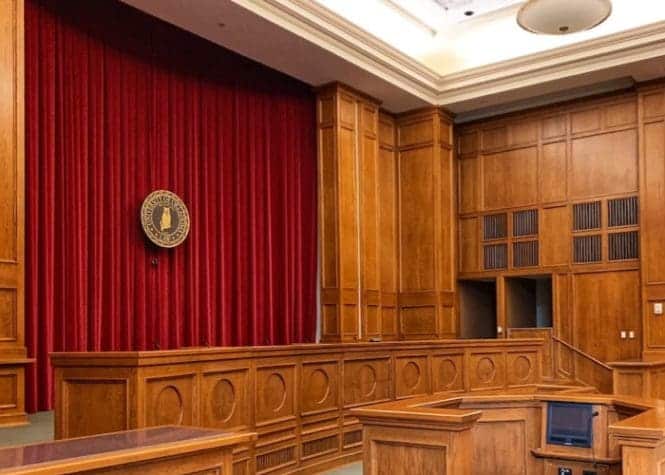The recent final order by the South Carolina Supreme Court in the endless property recovery litigation has attracted relatively little notice, perhaps because most observers have gotten tired of the protracted dispute. But hold the court case against other recent Episcopal litigation, and it quickly becomes clear that the denomination has a broken moral compass.
Dennis Canon litigation
In the property recovery litigation, the Episcopal Church sought court enforcement of the Dennis Canon, which asserts a denominational trust in all personalty and realty. The move came after conservative groups attempted to leave the Church and take property with them.
Many Church members said during the litigation, “They know those are the rules of the game. Property bought by Episcopal congregations belongs to the Episcopal Church.”
We get the point, but in many ways, this is a case of two bald men fighting over a comb.
Yes, the buildings in question carry historical and nostalgic significance, but the reality is that they are old, energy-inefficient, and ill-suited to modern needs. Thus, letting the properties go to whoever wants them makes sense.
But as far as the Episcopal Church is concerned, that’s what the canons say, and by gosh, we’re going to enforce the canons.
Abuse of legal process by Episcopal priests
That said, the Episcopal Church ignores its canons when its clergy engage in abuse of process.
Consider:
- Efforts by Episcopal priest Will Bouvel to claim that objecting to his ordination in a confidential letter to the bishop is a form of stalking. Yet no rational actor would argue that a letter sent in confidence is stalking.
- Similarly, bishops Alan Gates, Shannon Johnston, and Susan Goff have disregarded illegal conduct by clergy under their supervision, including filing false police reports, engaging in perjury, and perpetrating fraud upon the courts via the filing of false and malicious civil complaints.
The common denominator in these cases is that the priest violated the express provisions of the canons—the same rules of the road the Church invokes in the property recovery litigation.
Specifically, Title IV prohibits conduct involving “dishonesty, fraud, deceit, or misrepresentation.” Yet the Church ignores those provisions because, in every instance, the priest falsely portrays the defendant as a bad actor.
Forcing victims to sue to obtain justice
There’s another wrinkle in all of this. We’ve heard Episcopalians say many times that the dissident groups should recognize the applicability of the Dennis Canon, call it a day, and get their own buildings. That, versus forcing the Episcopal Church to sue to enforce its canons.
But that approach is outrageous hypocrisy when we examine it in light of the Church’s strategy in the current Colorado sexual abuse lawsuit, which is to litigate, litigate, litigate.
Whatever happened to repentance, restitution, and apology? Why should victims have to go to court to get the Church to be accountable for its actions?
Similarly, in the case of Chilton Knudsen, the victim of sexual abuse had to sue the Church to get relief. And no one out there believes Knudsen was telling the truth about notifying the police.
Even if, as she claims, Knudsen notified law enforcement, why didn’t she follow up when she didn’t hear back? A child’s well-being was on the line, yet Knudsen says she doesn’t know what else she could have done.
It’s called pick up the phone and document your actions. So spare us. If Knudsen can’t figure that out, she has no business being a priest, let alone a bishop.
So why does the Church insist that victims of its misconduct sue it to obtain redress? Is it because it can use the Church Pension Group (CPG), the Church’s captive insurance carrier, to play hardball, even as it decries injustice and oppression?
And we yet again point to other bishops and clergy who ignore child molestation, child rape, and the sexual harassment of adult women or cover these issues up.
The most recent person to join that club is the new intake officer for Title IV complaints against bishops, Barb Kempf, who continues to ignore requests for an update on the Title IV case filed months ago against George Sumner for engaging in illegal retaliation for opposing sexual harassment.
The latter raises an essential question for female church members: Why would you want to belong to, or give money to, a church where it’s okay to harass women sexually? A for-profit would have fired Sumner within hours, but he is still in office months later.
Why?
We’d note that while it still plays plenty of games, including its ethically questionable bankruptcies, the Roman Catholic church is miles ahead of the Episcopal Church in settling abuse claims, including forbidding nondisclosure agreements as a condition of settlement and backing away from hardball litigation tactics.
The progress of the Catholic Church should be a wake-up call to all Episcopalians. The latter like to babble on about the Baptismal Covenant and resisting injustice and oppression. Still, the Episcopal Church dishes out plenty of injustice and oppression regarding abusive priests.
Anglican Watch calls on the Episcopal Church to repent, make restitution, and stop playing games in the judicial system. That includes owning up to its misconduct versus forcing victims to litigate against the Church in hopes of obtaining justice.


I think it was in Luke where jesus said something about if you disagree with someone make sure you sue the shit out of them.